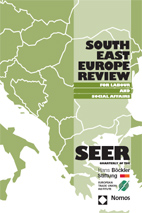Working conditions in the informal sector
Working conditions in the informal sector
Author(s): Manuela StănculescuSubject(s): Politics / Political Sciences
Published by: Nomos Verlag
Summary/Abstract: This is an empirical analysis based on the comparative data set collected within the research project Household, Work and Flexibility (HWF). 1Within the HWF project, a survey was conducted in the spring of 2001 using face-to-face interviews or telephone interviews (with nationally representative samples). Eight countries – western EU countries and a range of eastern European candidate countries – were chosen to be illustrative of different policy approaches to work flexibilisation and work-family balance (Wallace, 2003). In this article, we make use of seven of the original countries: the United Kingdom; the Netherlands; Slovenia; the Czech Republic; Hungary; Bulgaria; and Romania. The units of analysis are individuals aged 18-65 years. The working conditions of individuals active in the informal sector represents the focus of this article, whose main concern is the extent to which informal work is correlated with exploitation or self-exploitation. In describing the working conditions of informal employment, we analyse working time, place of work, job stability and changes after 1989, and satisfaction with various working conditions (job stability, duration of the employment contract, hours of work, place of work, earnings and general satisfaction with their main activity). The article focuses on the Romanian case but emphasises also the differences and similarities with the other countries, either the ex-socialist countries in transition or the capitalist western ones.
Journal: SEER - South-East Europe Review for Labour and Social Affairs
- Issue Year: 2005
- Issue No: 03
- Page Range: 79-93
- Page Count: 15
- Language: English

